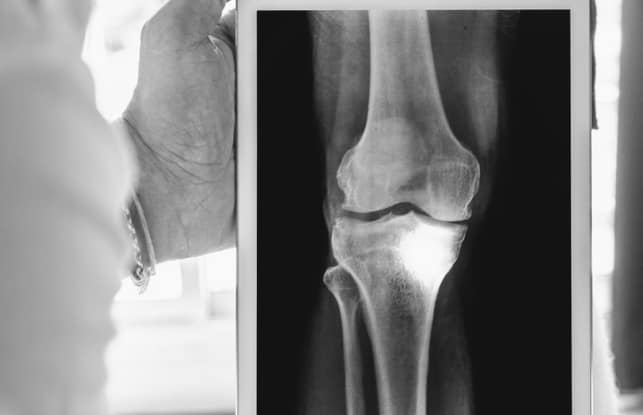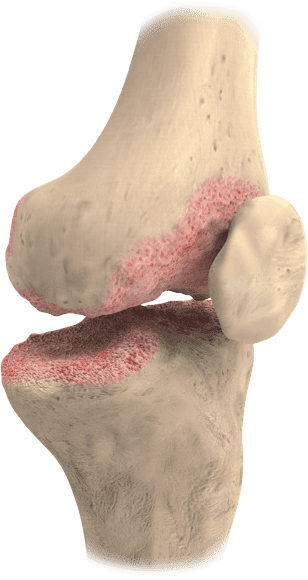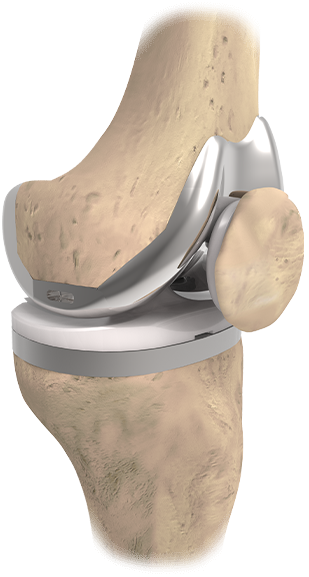
Replace Knee Pain with
the Joy of Living Life


Total Knee Replacement
It is often performed to repair knee damage caused by arthritis or traumatic injury. Damage to the knee from wear and tear could easily lead to daily and debilitating pain that may require surgical intervention. Ask your physician whether a total knee replacement surgery is right for you or a loved one.
How Does Your Knee Work?

Patella
Tibia
Femur


Femoral Component
Patellar Component
Tibial Insert
Tibial Baseplate

What is a Total Knee Replacement Surgery?
In a total or partial knee replacement surgery, the surgeon removes the damaged cartilage and portions of the thigh bone, shin bone or patella, and replaces them with medical implants designed to replicate the knee joint so that the artificial joint can perform the motion and function of the natural knee without pain or compromise.
How is a Total Knee Replacement Surgery Performed?

What To Expect After Total Knee Replacement Surgery?
The hospital stay after a total knee replacement surgery is typically one to five days5. Some patients may go home the same day of their surgery, but only if they are healthy enough to have their surgery in an outpatient setting and they have the right support at home for an early discharge. Some of the potential benefits of a same day discharge are less pain, lower infection risk, reduced blood transfusions, reduced healthcare cost, and increased patient satisfaction6.
There are also several potential risks associated with outpatient total joint surgery. These risks include managing potential complications at home, pain medication management, and potential admission to the hospital.
After surgery, physical therapy may begin the same day and may continue for up to three months7. Therapy is crucial to ensure rehabilitation as it assists to strengthen muscles, which in turn helps you to regain motion in the knee joint. You may need crutches, a walker or a cane for up to six weeks following your surgery7.
Depending on your recovery and your surgeon’s recommendations, some patients are able to resume everyday activities like walking, climbing stairs, and driving within four to six weeks after surgery7. Low impact sports and activities, such as walking, golf, and swimming, can usually be resumed within twelve weeks after surgery7, but only after your doctor approves the activity. Recovery time will vary for each patient.
Following your doctor’s recommendations and physical therapy schedule will help to facilitate a successful recovery following total knee replacement surgery.
1.American Academy of Orthopaedic Surgeons, Total Knee Replacement, https://orthoinfo.aaos.org/en/treatment/total-knee-replacement/
2.American Academy of Orthopaedic Surgeons, Projected Volume of Primary and Revision Total Joint Replacement in the U.S. 2030 to 2060, (Research News Webpage, 2018), https://aaos-annualmeeting-presskit.org/2018/research-news/sloan_tjr/
3.Arthritis-Heath, Knee Anatomy, https://www.arthritis-health.com/types/joint-anatomy/knee-anatomy
4.WebMD, Knee Replacement Surgery: What to Expect, https://www.webmd.com/osteoarthritis/knee-replacement-18/knee-surgery-what-expect
5.Arthritis-Heath, What to Expect After Knee Replacement, https://www.arthritis-health.com/surgery/knee-surgery/what-expect-after-knee-replacement
6.Cleveland Clinic, Joint Replacement: 5 Benefits of Outpatient Surgery, https://health.clevelandclinic.org/joint-replacement-5-benefits-of-outpatient-surgery/
7.Healthline, Recovery Timeline for TKR: Rehabilitation Stages and Physical Therapy, https://www.healthline.com/health/total-knee-replacement-surgery/rehabilitation-timeline